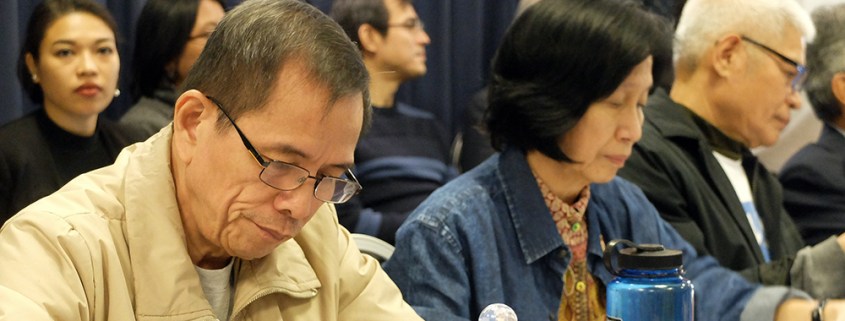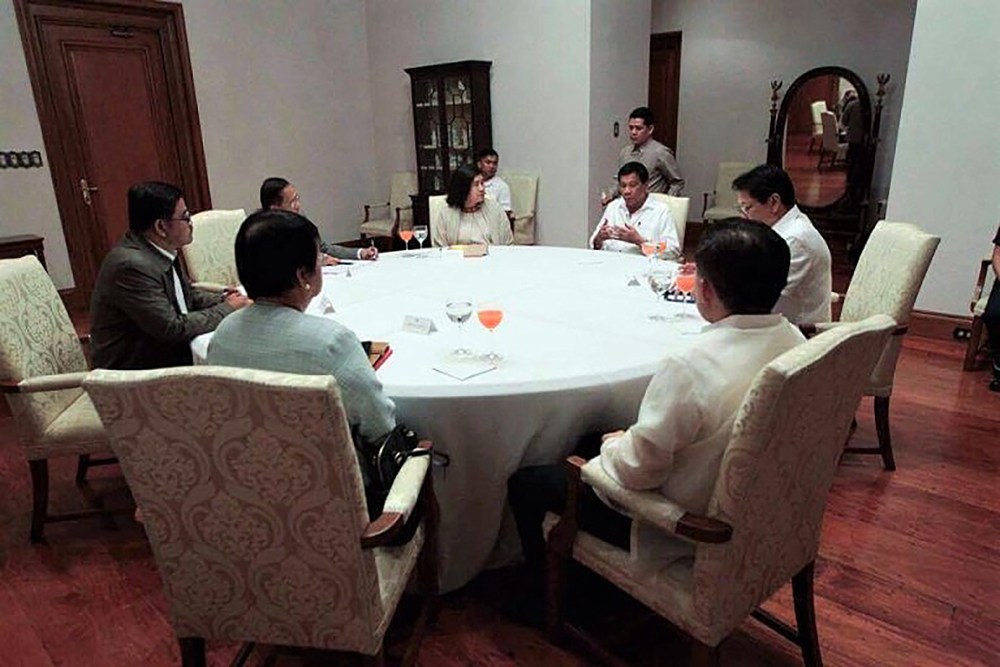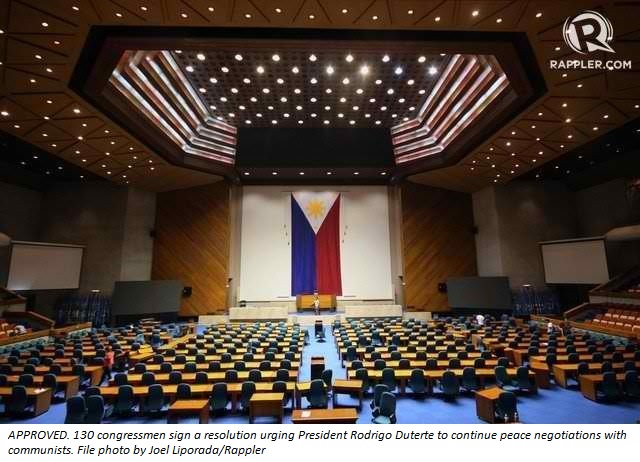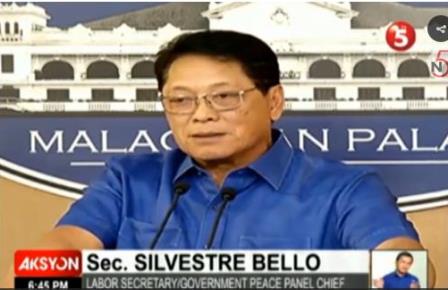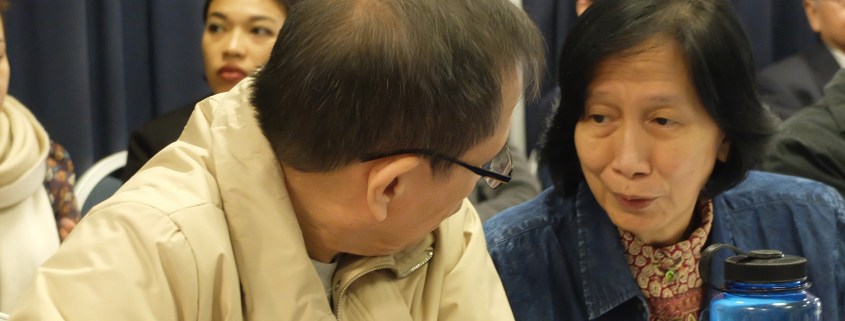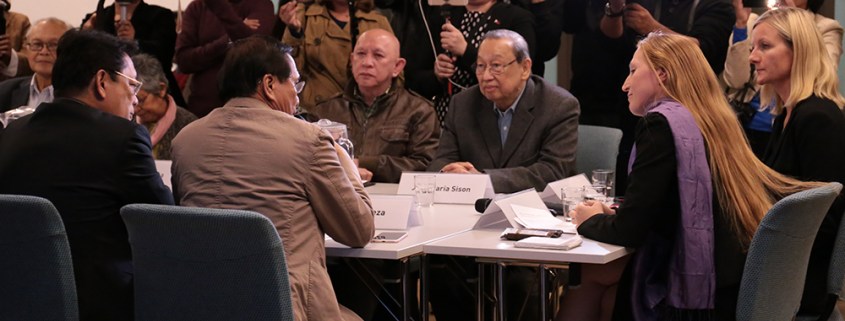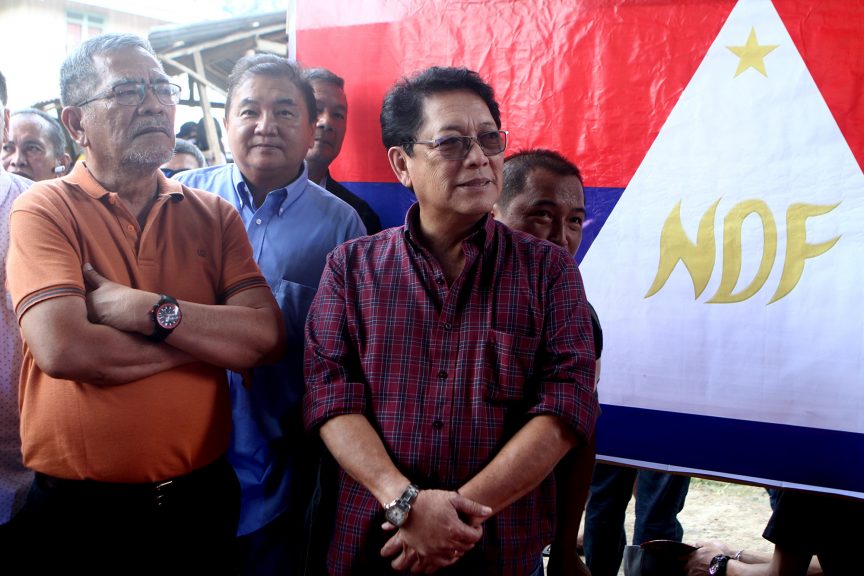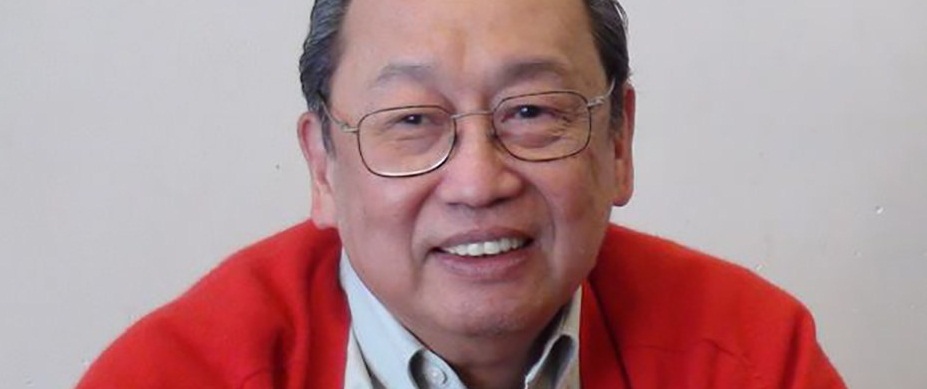
Kodao Productions
February 10, 2017
NATIONAL Democratic Front of the Philippines (NDFP) Chief Political Consultant Jose Maria Sison asked Government of the Republic of the Philippines (GRP) President Rodrigo Duterte to allow efforts to clear the air in the face of escalating tension between the two parties following the Duterte government’s declaration of an all-out war against the Left.
Sison proposed to his former student “to consult thoroughly with his negotiating panel and the peace advocates in his own cabinet and others outside of his government and encourage and allow back-channelling efforts to clarify misunderstandings and solve immediately the current problems.”
“President Duterte’s announcements to consider the CPP (Communist Party of the Philippines), NPA (New People’s Army) and NDFP as terrorist organizations and to terminate the Joint Agreement on Safety and Immunity Guarantees (JASIG) have the effect of terminating the entire GRP-NDFP peace negotiations,” Sison said.
“I believe that President Duterte’s reaction should not have gone this far,” he added.
Sison said he can understand the role of President Duterte in reacting as GRP president and Commander-in-Chief as simply performing his duty to speak and act in the interest of his government and express concern for his troops.
“But there should have been a measure of restraint in his reaction in order to preserve the GRP-NDF peace process,” Sison advised.
Sison added that the third party facilitator, the Royal Norwegian Government (RNG), deserves a briefing from each negotiating party to possibly enable the continuance of the peace process.
Earlier, RNG Special Envoy to the Philippine Peace Process Ambassador Elisabeth Slattum urged both the GRP and the NDFP to “protect the peace talks, as it is the only way to move forward towards a just and lasting peace.”
In a statement, Slattum said that “what defines the success of a peace process is the ability and commitment of the parties to stay at the negotiation table and not give up, despite setbacks.”
“What is important now is to protect the peace talks, as it is the only way to move forward towards a just and lasting peace, for the benefit of all Filipino people,” Slattum said.
Successful negotiations so far
Sison cited the gains made so far in the formal peace talks in Norway and Italy as reasons for the continuation of the negotiations.
“The recent third round of formal talks between the Government of the Republic of the Philippines (GRP) and the National Democratic Front of the Philippines (NDFP) from January 19 to 25, 2017 has been successful and has scheduled the fourth round on April 2-6 in Oslo,” Sison said.
Sison said there was a fair exchange of views and agreements on efforts to comply with the Comprehensive Agreement on Respect for Human Rights and International Humanitarian Law (CARHRIHL) concerning the release of all political prisoners, justice for and indemnification of victims of human right violations under the Marcos regime, allegations of human rights violations under Oplans Bayanihan, Tokhang and Kapayapaan, as well as the approval of the supplementary guidelines of the Joint Monitoring Committee.
There was also an initial discussion of the bilateral ceasefire agreement to replace the unilateral ceasefire declarations, Sison said.
The NDFP’s chief political consultant added that the biggest achievements in moving forward the peace process were the exchange of full drafts of the Comprehensive Agreement on Social and Economic Reforms (CASER) by the reciprocal working committees of the GRP and the NDFP, and the complete drafts of the CAPCR by the reciprocal working groups.
“I estimate that it is possible to unify these drafts within 2017. The NDFP has formally offered to GRP to co-found the Federal Republic of the Philippines on the basis of the CAPCR,” Sison said.
Sison said he believes it is possible to implement the CASER and CAPCR through GRP executive actions, legislation and constitutional amendments before the signing of the Comprehensive Agreement on End of Hostilities and Disposition of Forces (CAEHDF) in 2020-2021.
“Before then, a bilateral ceasefire agreement is possible, especially after the signing of the CASER and the CAPCR by the negotiating panels in 2017,” he said.
The GRP and NDFP ceasefire committees are scheduled to meet in The Netherlands on February 22 to discuss the former’s proposal for a bilateral ceasefire agreement, the possible discussion of which in Italy last month effectively scuttled by an attack by the AFP against an NPA encampment in Makilala, North Cotabato last January 21.
Talking while fighting
Sison said the clear and significant success of the third round of the formal talks has been overshadowed by the reaction of Duterte to the announcement of the termination of the unilateral ceasefire by the CPP and NPA, effective on February 10, and to the so-called self-defense actions already begun by the NPA in accordance with the terms of its unilateral ceasefire declaration.
“Even if the armed conflict between the armed forces of the two parties has resumed, peace negotiations can and must continue precisely to continue with the forging of the CASER, CAPCR and the bilateral ceasefire agreement and effecting the amnesty and release of all political prisoners within 2017,” Sison said.
“More than 10 major agreements were made during the (Fidel) Ramos regime while fighting went on,” he added.
Duterte’s peace adviser and negotiators—notably Jesus Dureza, Silvestre Bello III, Hernani Braganza, Rene Sarmiento and Maria Carla Munsayac—had been part of various Ramos government negotiating teams with the NDFP.
Sison said the CPP, NPA and NDFP remain committed to the peace process in accordance to the The Hague Joint Declaration and further agreements.
“They wish to pursue with the GRP the bright prospects that started with the first round of formal talks in August 2016 and overcome the peace spoilers that run counter to the progress that has been achieved in the third round of formal talks, Sison said.
We must respond to and strive to fulfil the Filipino people’s demand for a just and lasting peace,” he said. (Raymund B. Villanueva)

